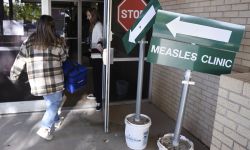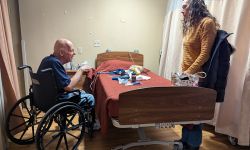Michigan releases more details about who gets COVID vaccine first

Dec. 21: Michigan health officials wrestling with who will get COVID vaccine next
Dec. 21: Five ethical questions raised by COVID vaccines in Michigan
Dec. 17: See where Michigan is shipping coronavirus vaccine, who is getting it
Dec. 14: What's it like to get the first vaccines? Health care workers share hopes, fears
A clearer picture emerged Friday of who gets the first COVID-19 vaccines, as Michigan officials prepared for the first shipments.
As early as Tuesday, 84,825 units of the BioNTech/Pfizer vaccine are set to arrive at Michigan’s hospitals. It’s a tiny fraction of what will be needed to reach the state’s goal of 5.4 million Michiganders, or about 70 percent of the population, by the end of next year.
On Thursday, an advisory panel to the U.S. Food and Drug Administration recommended the vaccine’s approval, but it was still awaiting a final green light Friday afternoon.
In a call with reporters Friday afternoon, state health officials would say only that the first batches of the BioNTech/Pfizer vaccine would be distributed to 56 hospitals and 16 health departments.
A second vaccine, by Massachusetts-based Moderna, is also up for FDA approval and is expected to be shipped within days.
Michigan Health officials would not detail which hospitals would receive those first batches, citing security concerns.
Related stories:
- COVID-19 vaccine nears approval. What Michigan needs to know.
- As COVID vaccine nears, Michigan calibrates pitch to wary African Americans
- Six things to know about the safety of the leading COVID vaccines
- Michigan health workers, senior facilities likely first for COVID vaccine
- Pfizer’s coronavirus vaccine is being made in Michigan
However, Detroit-based Henry Ford Health System will get at least 4,875 vaccines next week for its workers, Dr. Adnan Munkarah, the system’s executive vice president and chief clinical officer, said Friday.
Five hospitals in the Henry Ford Health — in Detroit, Wyandotte, West Bloomfield, Jackson, and Macomb — each will receive a shipment of 975 units as soon as Tuesday, with the second dose following three weeks later, said Munkarah, who noted the vaccine will not be mandatory.
Vaccines in follow-up shipments are expected to follow weekly, said Munkarah.
Beaumont Hospital in Troy, part of the state’s largest hospital system, also is awaiting a vaccine shipment “of about 1,000,” in the coming days, spokesperson Mark Geary told Bridge Michigan.
Phase 1 of vaccine distribution is divided into three groups:
- First: paid and unpaid people in health care settings and residents of long-term care facilities
- Second: essential workers in critical industries
- Third: those at high risk for severe COVID-19 illness and the elderly.
But the state’s chief medical executive, Dr. Joneigh Khaldun, has been quick to note that plans depend on the quantities of vaccines that arrive.
“The situation is continuously evolving,” she said Friday.
Vaccine priority
The Michigan Department of Health and Human Services set a goal of vaccinating 5.4 million Michiganders before the end of 2021. Before COVID vaccines are available to the public, health leaders say they will distribute limited supplies to curb the pandemic. This is an abbreviated version of the state’s priority plan.
PHASE 1A
- Emergency medical service providers, including medical first responders
- General medical floor staff
- Emergency departments
- Intensive care units
- Staff at skilled nursing facilities, psychiatric hospitals, homes for the aged, adult Foster care, and assisted living facilities
- Residents of skilled nursing facility residents, psychiatric hospitals, homes for the aged, adult foster care, and assisted living facilities
- Workers with direct patient contact in high-risk procedures such as dental care and those with direct patient contact in outpatient, urgent care, ambulatory care, and home health care.
- Workers in indirect patient contact
PHASE 1B
- K-12 school and child-care staff with direct contact with children
- Certain workers in critical infrastructure fields.
- Homeless shelters, corrections facilities, congregate childcare institutions and adult and child protective services
- Workers with other unique skill sets, such as non-hospital laboratories and mortuary services.
PHASE 1C
- Those age 65 years and older
- Those 18-64 years with COPD, hypertension, chronic kidney disease, heart disease, diabetes, obesity or other conditions that puts them at high risk. (Pregnant women are currently not recommended to receive the COVID-19 vaccine.)
Source: State of Michigan
See what new members are saying about why they donated to Bridge Michigan:
- “In order for this information to be accurate and unbiased it must be underwritten by its readers, not by special interests.” - Larry S.
- “Not many other media sources report on the topics Bridge does.” - Susan B.
- “Your journalism is outstanding and rare these days.” - Mark S.
If you want to ensure the future of nonpartisan, nonprofit Michigan journalism, please become a member today. You, too, will be asked why you donated and maybe we'll feature your quote next time!








